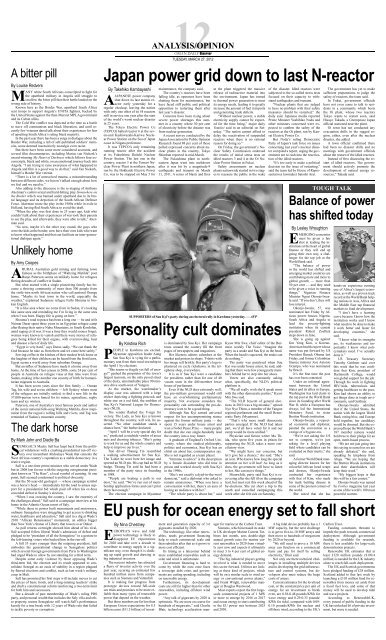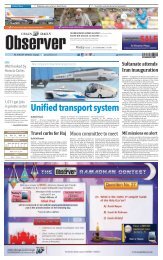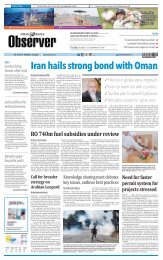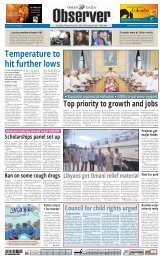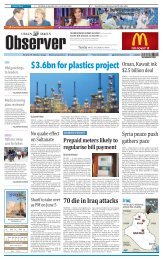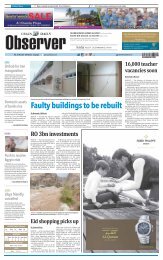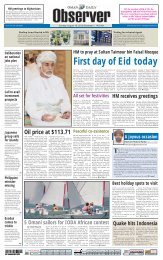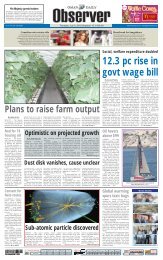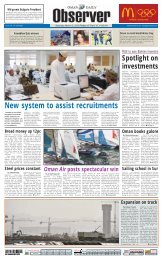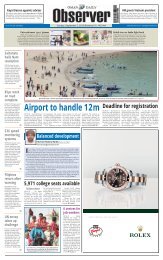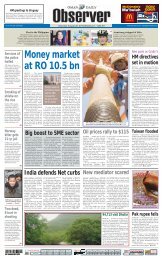Observer & Busness 27 Mar 2012 - Oman Daily Observer
Observer & Busness 27 Mar 2012 - Oman Daily Observer
Observer & Busness 27 Mar 2012 - Oman Daily Observer
You also want an ePaper? Increase the reach of your titles
YUMPU automatically turns print PDFs into web optimized ePapers that Google loves.
A bitter pill<br />
By Louise Redvers<br />
MANY white South Africans conscripted to ght for<br />
the apartheid military in Angola still struggle to<br />
swallow the bitter pill that their battle landed on the<br />
wrong side of history.<br />
Known here as the Border War, apartheid South Africa<br />
sent troops to support Angola’s UNITA ghters, backed by<br />
the United States against the then-<strong>Mar</strong>xist MPLA government<br />
and its Cuban allies.<br />
The Cold War conict was depicted at the time as a battle<br />
to stave off communism and black liberation, and until recently<br />
few veterans dared talk about their experiences for fear<br />
of upsetting South Africa’s ruling black majority.<br />
In the past year there has been a surge in dialogue about the<br />
Border War, including a raft of self-published soldiers’ memoirs,<br />
some deemed insensitively nostalgic even racist.<br />
But there have been some more considered accounts, and<br />
several lm documentaries, including <strong>Mar</strong>ius van Niekerk’s<br />
award-winning My Heart of Darkness which follows four exconscripts,<br />
black and white, on an emotional journey back into<br />
Angola. “I am trying to raise awareness of what happened in<br />
Angola and lm is a good way to do that,” said Van Niekerk,<br />
himself a Border War veteran.<br />
“There is a lot of unresolved trauma, a misunderstanding<br />
between different sides, we haven’t talked enough about how<br />
we feel and we need to.”<br />
Also adding to the discourse is the re-staging of Anthony<br />
Akerman’s controversial and hard-hitting play Somewhere on<br />
the Border which was banned under apartheid due to its brutal<br />
language and its depiction of the South African Defence<br />
Force. Akerman wrote the play in the 1980s while in exile in<br />
Holland, having ed South Africa to avoid the draft.<br />
“When the play was rst done in 25 years ago, kids who<br />
couldn’t talk about their experiences of war took their parents<br />
to see the play, and afterwards, they were able to talk,” Akerman<br />
said.<br />
“So now, maybe it’s the other way round, the guys who<br />
were the kids at the border, now have their own kids who want<br />
to know what happened and that can facilitate an inter-generational<br />
dialogue again.”<br />
Unlikely home<br />
By Amy Coopes<br />
A<br />
RURAL Australian gold mining and farming town<br />
famous as the birthplace of “Waltzing Matilda” poet<br />
Banjo Paterson seems an unlikely home for refugees<br />
eeing decades of conict in Sudan.<br />
But what started with a single pioneering family has become<br />
a thriving community of more than 300 people from<br />
the strife-torn north African nation who call pastoral Orange<br />
home. “Maybe its best town in the world, especially the<br />
weather,” explained Sudanese refugee Fathi Shouma in broken<br />
English.<br />
“It is like area where we come from in Sudan, it’s looking<br />
like same area and reminding me I’m living in the same area<br />
when I was born. Happy life is going on here.”<br />
Shouma’s road to peace has been a long one — he and wife<br />
Neimat Darar spent three years in an Egyptian refugee camp<br />
after eeing their native Nuba Mountains, in South Kordofan,<br />
amid raging civil war. It was a time they would sooner forget;<br />
women were known to vanish and there were stories of refugees<br />
being killed for their organs, with overcrowding, heat<br />
and disease a fact of daily life.<br />
“Egypt is very hard,” says Darar, sadly. “We can thank the<br />
God because he take us from there and we come here safely.”<br />
Serving coffee in the kitchen of their modest brick home as<br />
the laughter of their children can be heard from the front lawn,<br />
Egypt seems a world away from suburban Orange.<br />
But an inux of Sudanese have made it a home away from<br />
home. At the time of last census in 2006, some 24 per cent of<br />
people in Australia on refugee visas at that time were from<br />
Sudan, making it the number one country of birth for humanitarian<br />
migrants to Australia.<br />
It has been seven years since the rst family — Osman<br />
Tag, his wife and seven children — left Sydney where most<br />
of the refugees are initially settled, to nd a new life in the<br />
37,000-person town famed for its mines, agriculture, rugby<br />
team and icy winters.<br />
Paterson, one of Australia’s most famous poets and author<br />
of the iconic national folk-song Waltzing Matilda, drew inspiration<br />
from the region’s rolling hills and rivers, and Tag was<br />
reminded of Sudan’s mountain country.<br />
The dark horse<br />
By <strong>Mar</strong>k John and Diadie Ba<br />
SENEGAL’S Macky Sall has leapt back from the political<br />
wilderness with a crushing presidential run-off victory<br />
over incumbent Abdoulaye Wade that cements the<br />
West African country’s reputation as a stable democracy in a<br />
restive region.<br />
Sall is a one-time prime minister who served under Wade<br />
but in 2008 lost favour with the outgoing octogenarian president<br />
known as “The Hare”, a local symbol of cunning. At one<br />
point, Sall seemed condemned to political obscurity.<br />
But the 50-year-old geologist — whose campaign symbol<br />
was a horse’s head — immediately hit the road to amass support<br />
for a presidential bid which paid off when his ex-boss<br />
conceded defeat in Sunday’s election.<br />
“When I was crossing the country, I saw the enormity of<br />
the challenges ahead,” Sall said in a campaign interview at his<br />
home in the Atlantic Ocean resort of Saly.<br />
“While those in power built monuments and motorways,<br />
ordinary Senegalese were struggling to get access to drinking<br />
water, healthcare and education,” Sall said in a dig at Wade’s<br />
2010 “African Renaissance” monument, an edice bigger<br />
than New York’s Statue of Liberty that towers over Dakar.<br />
As poll returns overnight showed him ahead of his rival,<br />
Sall accepted fellow liberal Wade’s admission of defeat and<br />
pledged to be “president of all the Senegalese” in a gesture to<br />
the left-leaning voters who backed him in the run-off.<br />
A full 35 years younger than the outgoing president, Sall<br />
embodies the generational change in Senegalese politics<br />
which several foreign governments from Paris to Washington<br />
had urged Wade to allow by not standing for a third term.<br />
Despite some early violence by those opposing Wade’s<br />
third-term bid, the election and its result appeared to consolidate<br />
Senegal as an oasis of stability in a region plagued<br />
by awed elections and conict, such as last week’s military<br />
coup in Mali.<br />
Sall has promised his rst steps will include moves to cut<br />
the prices of basic foods, end a long-running teachers’ strike<br />
and draft a constitutional reform reinforcing a two-term limit<br />
for both him and successors.<br />
But a decade of past membership of Wade’s ruling PDS<br />
party, and personal wealth that includes the Saly villa and other<br />
property, means Senegalese will watch Sall’s performance<br />
keenly for a true break with 12 years of Wade rule that failed<br />
to tackle poverty or corruption.<br />
By Takehiko Kambayashi<br />
A<br />
JAPANESE power company<br />
shut down its last atomic reactor<br />
early yesterday for a<br />
regular checkup, leaving the nation<br />
with only one other of its 54 reactors<br />
still in service one year after the start<br />
of the world’s worst nuclear disaster<br />
in 25 years.<br />
The Tokyo Electric Power Co<br />
(TEPCO) halted reactor 6 at the seven-unit<br />
Kashiwazaki-Kariwa Nuclear<br />
Power Station on the Sea of Japan<br />
coast in Niigata prefecture.<br />
It was TEPCO’s only remaining<br />
running reactor after the accident<br />
at its Fukushima Daiichi Nuclear<br />
Power Station. The last one in the<br />
country, reactor 3 at the Tomari Nuclear<br />
Power Plant in northern Japan,<br />
run by the Hokkaido Electric Power<br />
Co, was to be stopped on May 5 for<br />
12<br />
ANALYSIS/OPINION<br />
OMAN DAILY <strong>Observer</strong><br />
TUESDAY, MARCH <strong>27</strong>, <strong>2012</strong><br />
Japan power grid down to last N-reactor<br />
SUPPORTERS of Suu Kyi’s party during an electoral rally in Kawhmu yesterday. — AFP<br />
Personality cult dominates<br />
By Kristina Rich<br />
PEOPLE in Kawhmu are excited.<br />
Myanmar opposition leader Aung<br />
San Suu Kyi is vying for a parliamentary<br />
seat from their rural township in<br />
the April 1 by-elections.<br />
“She seems so fragile yet full of energy!”<br />
gushed the proprietor of the town’s<br />
largest tearoom, on the only paved street<br />
of the dusty, unremarkable place 90 minutes<br />
drive south-west of Yangon.<br />
At the market, the watchmaker’s<br />
display case was adorned with a large<br />
sticker depicting a ghting peacock and<br />
white star on a red eld, the emblem of<br />
Suu Kyi’s National League for Democracy<br />
(NLD).<br />
The vendor ashed the V-sign for<br />
victory. The Lady, as Suu Kyi is known<br />
throughout the country, will win, he asserted.<br />
“No other candidate stands a<br />
chance here,” the barber declared.<br />
“April 1 will be a very special day for<br />
us,” predicted a roadside vendor of areca<br />
nuts and chewing tobacco. “She’s going<br />
to work for us and the whole country and<br />
help to improve our lives.”<br />
Taxi driver Thaung Tin resembled<br />
a walking advertisement for Suu Kyi.<br />
The T-shirt he wore bore her image and<br />
sported an NLD pin. His cap had an NLD<br />
badge. Thaung Tin said he had been a<br />
member of the party since its founding<br />
in 1988.<br />
“People are beating a path to our<br />
door,” he said. “We’ve run out of membership<br />
application forms and can’t print<br />
them fast enough.”<br />
The election campaign in Myanmar<br />
By Nina Chestney<br />
EUROPEA’S wave and tidal<br />
power technology is likely to<br />
disappoint EU expectations<br />
for 2020 and take over a decade to<br />
contribute to energy supply in a signicant<br />
way, even though it is chalking<br />
up rapid growth and drawing in<br />
big industrial investors.<br />
The nascent industry has attracted<br />
a urry of investor activity over the<br />
past year, securing an estimated few<br />
hundred million euros from companies<br />
such as Siemens and Vattenfall.<br />
It is making fast progress from<br />
prototype devices toward full-scale<br />
sea trials and promises to be more reliable<br />
than many types of renewable<br />
power that depend on the weather.<br />
But those numbers are far less than<br />
European Union expectations for 8.5<br />
billion euros ($11.3 billion) of invest-<br />
maintenance, the company said.<br />
The country’s reactors have been<br />
falling idle, as operators have been<br />
shutting them for maintenance, but<br />
have faced stiff public and political<br />
opposition to restarting them after<br />
last year’s disaster.<br />
Concerns have been rising about<br />
severe power shortages this summer<br />
in a country where 30 per cent<br />
of electricity before the disaster was<br />
from nuclear generation.<br />
A recent survey conducted by the<br />
Japan Association for Public Opinion<br />
Research found 88 per cent of those<br />
polled expressed concerns about nuclear<br />
plants in the country, Tokyo<br />
Shimbun reported in mid-<strong>Mar</strong>ch.<br />
The Fukushima plant in northeastern<br />
Japan went into meltdown<br />
after it was hit by a magnitude-9<br />
earthquake and tsunami on <strong>Mar</strong>ch<br />
11, 2011. A series of blasts and res<br />
is dominated by Suu Kyi. Her campaign<br />
tours around the country ll the front<br />
pages of newspapers and magazines.<br />
Her likeness adorns calendars at the<br />
market and posters in shops. T-shirts with<br />
her image sell briskly. Her party’s logo is<br />
plastered on cycle rickshaws, in the telephone<br />
shop, everywhere.<br />
It is as if Suu Kyi were a candidate<br />
for president, rather than for one of 40<br />
vacant seats in the 440-member lower<br />
house of parliament.<br />
Even if the NLD does extremely well,<br />
the pro-military government would still<br />
have an overwhelming parliamentary<br />
majority. Not everyone considers the<br />
personality cult surrounding the pro-democracy<br />
icon to be a good thing.<br />
Although Suu Kyi earned universal<br />
respect for her uncompromising stance<br />
against the former military junta — she<br />
spent 15 years under house arrest and<br />
won a Nobel Peace Prize — many people<br />
doubt that she can single-handedly lead<br />
the country into a rosy future.<br />
A graduate of England’s Oxford University,<br />
where she studied philosophy,<br />
politics and economics, Suu Kyi has an<br />
elitist air about her, contemporaries say.<br />
She is not regarded as a team player.<br />
“Immune to advice” is the description<br />
by a female dissident who did time in<br />
prison and worked closely with Suu Kyi<br />
in the 1990s.<br />
“She’s not exactly a dyed-in-the-wool<br />
democrat,” said a diplomat who asked to<br />
remain anonymous. “When you have a<br />
conversation with her, there’s an aura of<br />
having an audience with her.”<br />
“The whole party is about her,” said<br />
ment and generation capacity of 3.6<br />
gigawatts installed by 2020.<br />
The technology, like other renewables,<br />
needs government nancing<br />
help to reach commercial scale and<br />
then subsidies after that as it grows to<br />
more cost efcient.<br />
Its timing as a latecomer behind<br />
more established renewables such as<br />
solar and wind is unfortunate.<br />
Government nancing is hard to<br />
come by while the euro zone faces<br />
a sovereign debt crisis and governments<br />
are cutting spending, including<br />
on renewable energy.<br />
Furthermore, its development<br />
costs are still far higher than for other<br />
renewables, including offshore wind<br />
power.<br />
“Any talk of gigawatts by 2020 is<br />
optimistic. We are more on course for<br />
hundreds of megawatts,” said Charlie<br />
Blair, technology acceleration man-<br />
at the plant triggered the massive<br />
release of radioactive material into<br />
the environment. Japan has turned<br />
to thermal power generation to meet<br />
its energy needs, leading it to greatly<br />
increase the amount of fuel it imports<br />
and generating trade decits.<br />
“Without nuclear power, a stable<br />
electricity supply cannot be expected<br />
for the time being,” major daily<br />
Yomiuri said in an editorial on Saturday.<br />
“The nation cannot afford to<br />
delay the reactivation of suspended<br />
reactors when there is no rational<br />
reason for doing so.”<br />
On Friday, the government’s Nuclear<br />
Safety Commission endorsed<br />
the results of initial stress tests on<br />
idled reactors 3 and 4 at the Oi Nuclear<br />
Power Station in Fukui.<br />
Safety assessments on nuclear<br />
plants nationwide started in two stages<br />
to reassure the public in the wake<br />
Kyaw Min Swe, chief editor of the Burmese<br />
weekly The Voice. “Imagine the<br />
party as a snake and Suu Kyi as the head.<br />
When the head is squeezed, the snake can<br />
do nothing.”<br />
The party was paralysed when Suu<br />
Kyi was under house arrest, he said, adding<br />
that there were few young party members<br />
behind her to step into her shoes.<br />
Voters are also constantly asking<br />
what, specically, the NLD’s political<br />
platform is.<br />
“We all really wish she’d speak more<br />
with the other democratic parties,” Kyaw<br />
Min Swe said.<br />
“The NLD boycott of general elections<br />
in 2010 was a big mistake,” opined<br />
Nyo Nyo Thinn, a member of the Yangon<br />
regional parliament and the small Democratic<br />
Party (Myanmar).<br />
“That’s why more small democratic<br />
parties emerged. If the NLD had taken<br />
part, we’d all have voted for it and our<br />
camp would be more unied.”<br />
Physician and ction writer Ma Thida,<br />
who spent ve years in prison for<br />
supporting the NLD, takes a more conciliatory<br />
view.<br />
“We might have our concerns, but<br />
let’s give her a chance,” she said. “She’s<br />
an icon. Who knows how long the special<br />
attention on her will last? As long as it<br />
does, the government will have to listen<br />
to her. She can move things.”<br />
Meanwhile, party said Suu Kyi is recovering<br />
after she fell ill on the campaign<br />
trail, but must rest this week ahead of the<br />
by-elections. She cut short a trip to the<br />
south and cancelled campaigning this<br />
week after she felt sick on Saturday.<br />
ager for marine at the Carbon Trust.<br />
Siemens, which increased its stake<br />
in UK developer <strong>Mar</strong>ine Current Turbines<br />
last month, sees double-digit<br />
annual growth rates for marine current<br />
renewables to 2020 from virtually<br />
zero now and expects it ultimately<br />
to meet 3 to 4 per cent of global energy<br />
demand.<br />
“The big industrial players getting<br />
involved is what is needed to move<br />
this sector forward. Utilities are looking<br />
at these kind of projects, which<br />
will be on a similar scale to wind energy<br />
or conventional power plants,”<br />
said Frank Wright, renewables manager<br />
at Douglas Westwood.<br />
Most experts expect the rst largescale<br />
commercial projects of 1 MW<br />
or more to emerge by 2016 or 2017<br />
and ocean energy to start contributing<br />
to the EU power mix between 2025<br />
and 2030.<br />
of the disaster. Idled reactors were<br />
subjected to the so-called stress tests<br />
focused on their capacity to withstand<br />
earthquakes and tsunami.<br />
“Nuclear plants that are judged<br />
to have no problem with their safety<br />
measures should be restarted,” the<br />
daily said. Japanese media reported<br />
Prime Minister Yoshihiko Noda and<br />
other ministers concerned were expected<br />
to conrm the safety of the<br />
reactors at the Oi plant, run by Kansai<br />
Electric Power Co.<br />
But Noda’s ruling Democratic<br />
Party of Japan’s task force on issues<br />
concerning last year’s nuclear disaster<br />
compiled a report, urging the government<br />
not to rush into the reactivation<br />
of the idled reactors.<br />
“It’s too early to make a political<br />
decision on the issue of restarting,”<br />
said the team led by House of Representatives<br />
lawmaker Satoshi Arai.<br />
By Lesley Wroughton<br />
EMERGING economies<br />
must be given a fair<br />
shot at leading the institutions<br />
at the heart of global<br />
nance or they will end up<br />
going their own way, a challenger<br />
for the top job at the<br />
World Bank said.<br />
“The balance of power<br />
in the world has shifted and<br />
emerging market countries are<br />
contributing more and more to<br />
global growth — more than<br />
50 per cent — and they need<br />
to be given a voice in running<br />
things,” Nigerian Finance<br />
Minister Ngozi Okonjo-Iweala<br />
said. “If you don’t, they will<br />
lose interest.<br />
Okonjo-Iweala, 57, was<br />
nominated last Friday by African<br />
power houses Nigeria,<br />
South Africa and Angola to<br />
lead the poverty-ghting<br />
institution when its current<br />
president Robert Zoellick<br />
steps down in June.<br />
She is going up against<br />
Jim Yong Kim, a Korean-<br />
American health expert whose<br />
name was put forward by US<br />
President Barack Obama last<br />
Friday, and former Colombian<br />
nance minister Jose Antonio<br />
Ocampo, who was nominated<br />
by Brazil.<br />
It’s the rst time the post<br />
has ever been contested.<br />
Under an informal agreement<br />
between the United<br />
States and its allies in Europe,<br />
Washington has laid claim to<br />
the top post at the World Bank<br />
since its founding after World<br />
War II, while a European has<br />
always led the International<br />
Monetary Fund, its sister<br />
Bretton Woods institution.<br />
Okonjo-Iweala, a respected<br />
economist and diplomat,<br />
painted the convention as a<br />
vestige of a bygone era.<br />
“We’re not asking the US<br />
not to compete, we’re just<br />
asking for a level playing<br />
eld where candidates can be<br />
evaluated on their merits,” she<br />
said.<br />
A former World Bank managing<br />
director known for her<br />
colourful African head wraps<br />
and dresses, Okonjo-Iweala<br />
contrasted her experience<br />
with that of Kim, who made<br />
his mark battling disease in<br />
some of the poorest corners of<br />
the world.<br />
She noted that she has<br />
A big tidal device probably has a 1<br />
MW capacity, but the next challenge<br />
is to get to ve-to-10 MW arrays and<br />
then move to hundreds of megawatts<br />
by 2020 or beyond.<br />
“We still need to prove a 10 MW<br />
array can function on a commercial<br />
basis and pay for itself by selling<br />
electricity,” Blair said.<br />
Not only are there technical challenges<br />
in installing multiple devices<br />
and in developing the grid infrastructure<br />
and control systems, but developers<br />
also must reduce the huge<br />
costs of arrays.<br />
Current estimates for the levelised<br />
cost, or the constant price per unit of<br />
energy for an investment to break<br />
even, are 0.38-0.48 pounds/KWh for<br />
wave energy and 0.29-0.33 pounds/<br />
KWh for tidal, compared with 0.09-<br />
0.10 pounds/KWh for nuclear and<br />
offshore wind, according to the UK’s<br />
The government has yet to make<br />
sufcient preparations to judge the<br />
safety of reactors, the team said.<br />
In Fukui, government ofcials<br />
have not even come to talk to residents<br />
in a community which hosts<br />
the Oi plant, whose two reactors<br />
Tokyo wants to restart soon, said<br />
Hisayo Takada, a Greenpeace Japan<br />
ofcial stationed near the plant.<br />
Oi town has not conducted any<br />
evacuation drills in the rugged region,<br />
either, even after the nuclear<br />
disaster, she added.<br />
A town ofcial conrmed there<br />
had been no disaster drills and no<br />
meetings with government ofcials<br />
about the restart of the idled reactors.<br />
Instead of rst discussing the restart<br />
of idled reactors, “the government<br />
should actively promote the<br />
development of natural energy resources,”<br />
Takada said.<br />
TOUGH TALK<br />
Balance of power<br />
has shifted today<br />
hands-on experience running<br />
one of Africa’s largest economies,<br />
as well as a proven track<br />
record at the World Bank helping<br />
nations in Asia, Africa and<br />
the Middle East tap nancial<br />
markets to fund development.<br />
“I don’t have a learning<br />
curve because I know how the<br />
institution works and I know<br />
what needs to be done to make<br />
it work better and faster for<br />
developing countries,” she<br />
said.<br />
“I know what its strengths<br />
are, its weaknesses and importantly<br />
I know what policymakers<br />
need. I’ve actually<br />
done it.”<br />
US Treasury Secretary<br />
Timothy Geithner said over<br />
this week that he was condent<br />
that Kim, president of<br />
Dartmouth College, would<br />
win global support for the job.<br />
Through his work in ghting<br />
HIV/Aids, tuberculosis and<br />
getting healthcare to the poor,<br />
Kim had shown an ability to<br />
get things done in tough environments,<br />
said Geithner.<br />
Okonjo-Iweala admitted<br />
that if the United States, the<br />
nation with the largest World<br />
Bank voting bloc, and Europe<br />
held together, her candidacy<br />
would be doomed. But she expressed<br />
hope the World Bank’s<br />
187 member nations would<br />
hold true to their pledge for an<br />
open, merit-based process.<br />
“We are not just going into<br />
this saying to ourselves we are<br />
already defeated,” she said,<br />
speaking by telephone from<br />
Abuja. “We are hoping that<br />
the Bretton Woods institutions<br />
and their shareholders will<br />
keep their word.”<br />
“My biggest hope is that<br />
this will be a fair contest.”<br />
Okonjo-Iweala was named<br />
by Forbes magazine last year<br />
as one of the world’s 100 most<br />
powerful women.<br />
EU push for ocean energy set to fall short<br />
Carbon Trust.<br />
Funding constraints threaten to<br />
impede the push towards commercial<br />
deployment. Although government<br />
funding is available for research,<br />
there is less available for large-scale<br />
demonstration projects.<br />
Renewable UK estimates that at<br />
least £120 million pounds ($190.4<br />
million) is needed for the UK industry<br />
alone to reach full-scale deployment.<br />
The UK and Scottish governments<br />
have pledged funding of £38 million.<br />
Scotland added to that last week by<br />
launching a £103 million fund for renewables<br />
from money set aside from<br />
a fossil fuel levy, and some of that<br />
money will be used to develop tidal<br />
and wave projects.<br />
According to RenewableUK,<br />
every pound of public funding in the<br />
UK has unlocked £6 of private investment,<br />
but more is needed.


